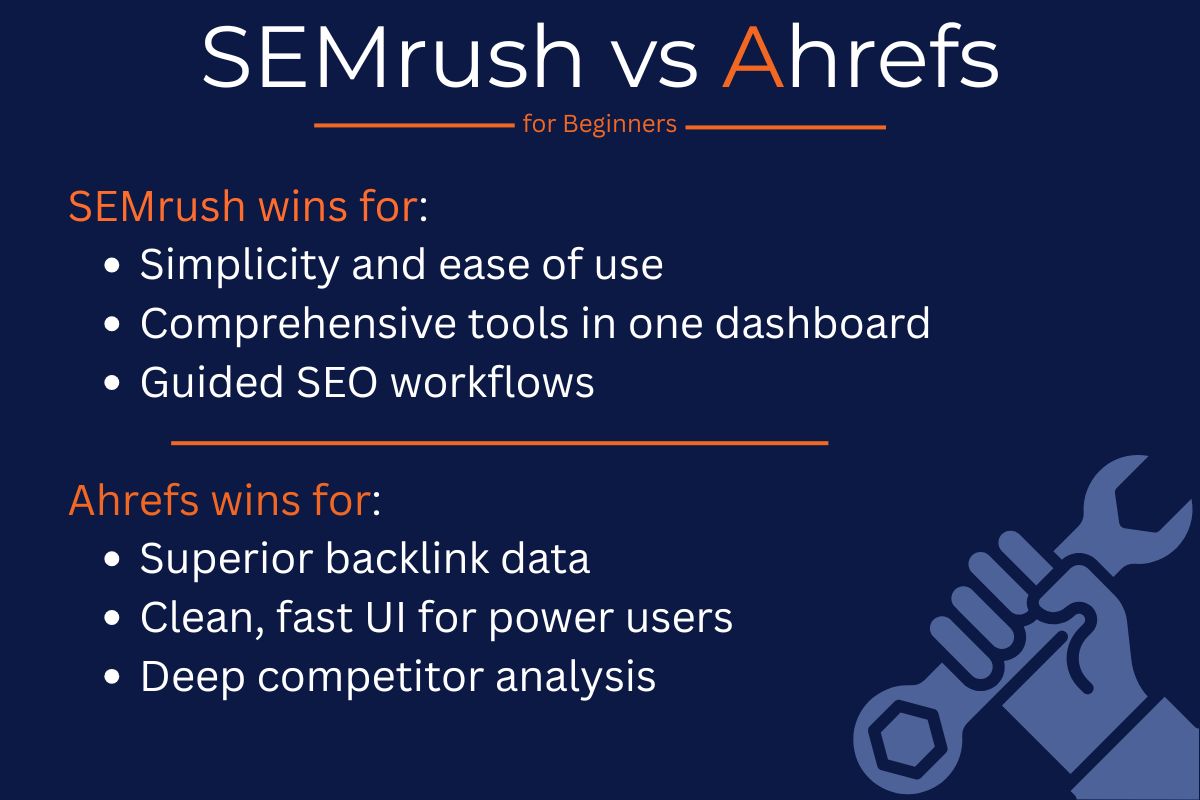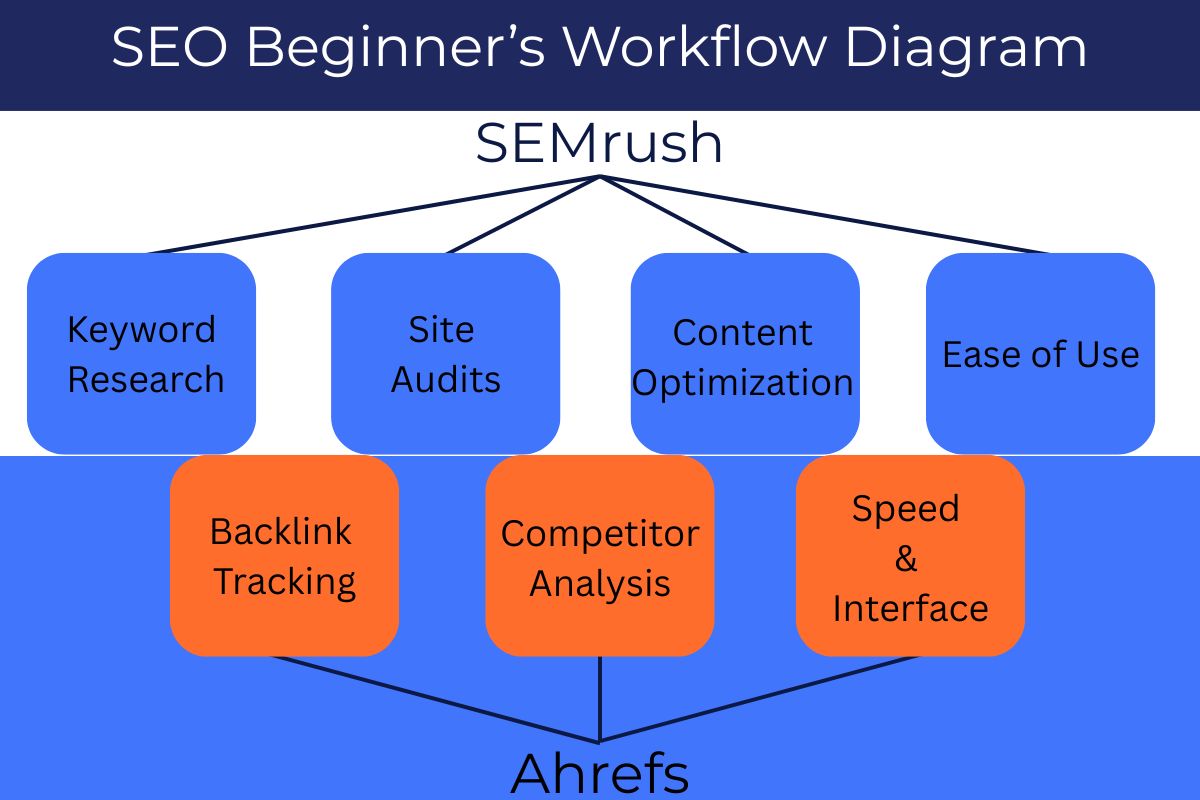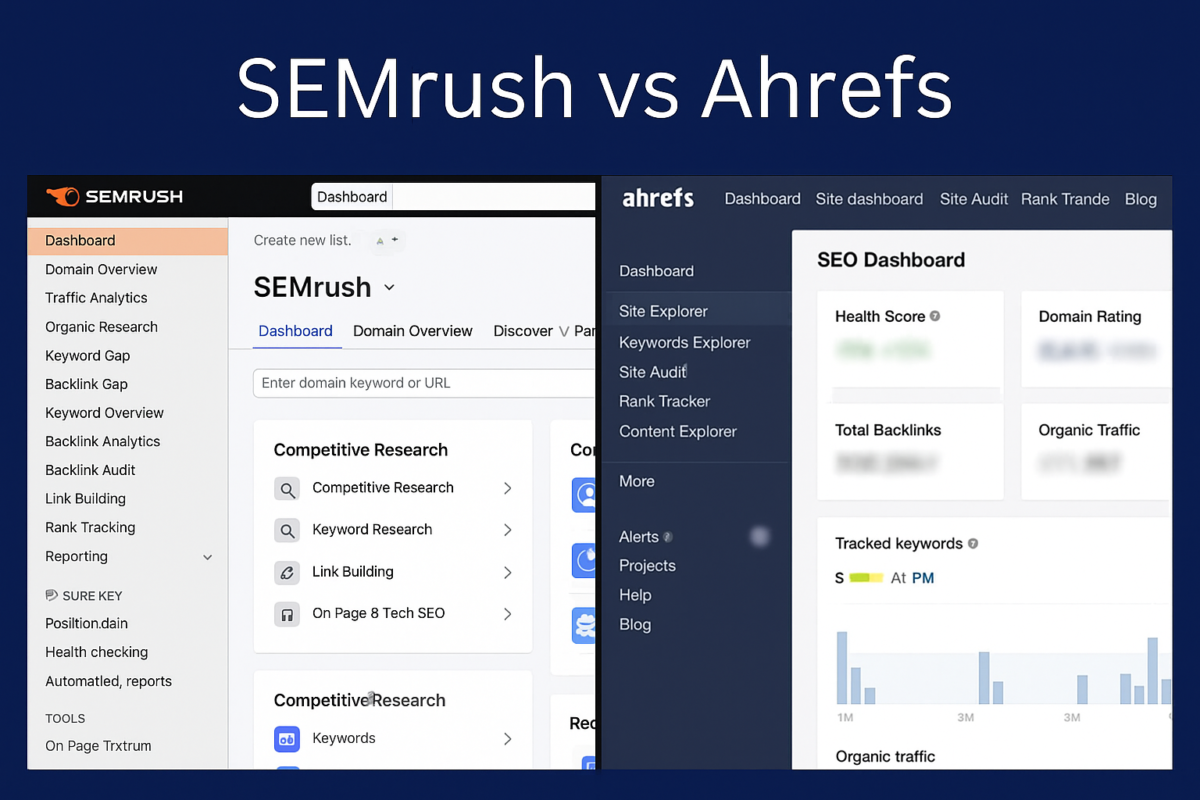SEMrush vs Ahrefs: Which Tool Wins for Beginners?
For anyone just getting into SEO, picking the right tool can feel like choosing between two unfamiliar maps. It’s known that SEMrush and Ahrefs are the most popular SEO tools, but which one is better for beginners?
Both Ahrefs and SEMrush are powerhouse SEO platforms, but beginners often struggle to decide which one offers the smoother entry point. If ease of use, clear guidance, and fast value are the priority, SEMrush edges ahead.

Why SEMrush Is More Beginner-Friendly
- Onboarding and Interface: SEMrush offers a more intuitive dashboard with built-in guidance. From tooltips to tutorials, it eases new users into core SEO tasks.
- All-in-One Toolkit: Beginners benefit from SEMrush’s built-in tools — keyword research, site audit, content optimization, and social media tracking — without needing to integrate third-party services.
- Built-in Templates and Reports: Pre-made SEO reports and checklists help beginners stay on track without feeling overwhelmed.
Ahrefs isn’t far behind, especially in backlink analysis and keyword data quality. But its harder learning curve and less guided experience can slow down newcomers.
Core Differences Between Ahrefs and SEMrush
Understanding the difference between Ahrefs and SEMrush comes down to three main categories: keyword research, backlink analysis, and usability.
Keyword Research
When comparing Ahrefs vs SEMrush keyword research, SEMrush offers a broader range of metrics and filters right out of the box. It supports topic clustering, search intent labels, and content gap analysis with a smoother interface.
Ahrefs delivers strong volume accuracy and advanced filtering, but some features are harder to find for new users.
Backlink Analysis
In the Ahrefs vs SEMrush backlinks battle, Ahrefs leads in raw backlink data. Its index is updated frequently and uncovers deeper link profiles. If backlink outreach is the main strategy, Ahrefs is worth learning despite the curve.
However, SEMrush adds value by integrating backlink data with broader SEO metrics, helping beginners understand link value in context.
Usability and Workflow
When it comes to what is easier: SEMrush or Ahrefs, SEMrush wins. The platform structures its tools around common tasks like site audits, competitor analysis, and technical SEO, making it easier for beginners to know where to start.
Ahrefs has a more basic, no-frills interface. It gets powerful once mastered, but new users often need tutorials or trial-and-error to unlock its full value.

Real-World Scenarios: SEMrush and Ahrefs in Action
To go beyond theory, here’s how beginners might use each tool in a real SEO workflow.
Scenario 1: Building an SEO Strategy from Scratch
A beginner launching a blog or small business site will need help with:
- Keyword research
- Competitor analysis
- Site audits
SEMrush excels here. Its tools for site health, keyword gaps, and automated reports make it a reliable roadmap for early SEO wins. The platform aligns with the SEO keyword research guide in a very beginner-friendly way.
Scenario 2: Deep-Dive Backlink Campaigns
If the main strategy is link-building or analyzing competitor links, Ahrefs provides a better edge. It’s widely trusted for backlink audits and reveals hidden linking opportunities others miss. For agencies or link-focused strategies, it may be worth the learning curve.
Pricing and Value
Both tools offer entry-level plans, but the value depends on what the user needs.
- SEMrush: Starts at $129.95/month. More tools are included per plan. Better suited for users wanting an all-in-one solution.
- Ahrefs: Starts at $99/month. Focuses on core SEO features with fewer extras.
For those comparing Ahrefs or SEMrush based on features-per-dollar, SEMrush typically delivers more value early on.
Pro Tip: Look Beyond Surface Metrics
Most beginners obsess over surface-level numbers like keyword difficulty or search volume. But real SEO gains come from understanding ranking factors in context.
Insider’s Edge: Use SEMrush’s “Keyword Magic Tool” to group queries by intent and difficulty, then cross-check those pages with your competitors’ top URLs. Instead of chasing volume, go after under-served topics where your site can realistically compete. This tactic aligns your keyword strategy with search engine positioning goals, not just traffic.
Common Misconceptions: Ahrefs vs SEMrush for Beginners
Many new users assume all SEO tools are plug-and-play. In reality:
- No tool replaces strategy. SEMrush and Ahrefs both require understanding what you’re trying to achieve.
- More data isn’t always better. Beginners often drown in metrics without clear next steps.
- Automation helps, but knowing how to interpret the data is what drives results.

Final Verdict: SEMrush vs Ahrefs for Beginners
So, which is better: SEMrush or Ahrefs for beginners?
SEMrush wins for:
- Simplicity and ease of use
- Comprehensive tools in one dashboard
- Guided SEO workflows
Ahrefs wins for:
- Superior backlink data
- Clean, fast UI for power users
- Deep competitor analysis
In the end, if the goal is to compare Ahrefs and SEMrush and get started quickly, SEMrush is the better launchpad for beginners. It balances simplicity with depth, giving newcomers a clear way to learn by doing.
Still, tools alone can only go so far. For those who want results without the trial-and-error phase, working with professionals like Indexed Zone SEO can make a big difference. They manage the full SEO process — from audits to rankings — so beginners don’t have to go it alone.
FAQ
1. Can you use both SEMrush and Ahrefs together?
Yes, many SEO professionals use both tools to cover different strengths — one for backlinks, the other for content and audits.
2. Is there a free version of SEMrush or Ahrefs for beginners to try?
Both offer limited trials or free tools, but access to full features requires a paid plan.
3. How long does it take to see SEO results using these tools?
Results depend on your strategy, consistency, and site condition — tools help, but time and effort still matter.
4. Do these tools help with local SEO for small businesses?
Yes, especially SEMrush, which includes local listing management and location-specific tracking in some plans.


